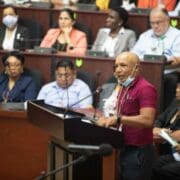Black Immigrant Daily News
Preparation works are underway at the Guyana National Stadium, where the Ministry of Housing and Water will launch the much-anticipated Building Expo 2022 on July 22.
Already, approximately 320 exhibitors, both local and international, have registered to participate in the event. This will see local companies from the hardware industry, furniture business, construction, real estate, financial institutions, government agencies, Go-Invest and the hotel industry, among others participating.
Minister of Housing and Water, Collin Croal said the expo will be ‘family-friendly’ so that persons can have the opportunity to look at different types of housing and make collaborative decisions when choosing their homes.
“We want this to be a family atmosphere, this is not just for business persons. The real beneficiaries are our citizens, our residents, the people of Guyana, so we want the families to come out, and that’s why we are making it a family atmosphere, so that together when both parties come, it is important because it helps in planning,” the Minister said.
The Central Housing and Planning Authority (CHPA) is currently constructing model houses which will depict the ministry’s young professional houses, as well as the moderate and low-income units. Private companies will also showcase their model houses.
Minister Croal explained that, “there will be a demonstration of using recycled waste for the construction of houses. The demonstration is already here so they’ve cleared it and so that will start tomorrow.”
Also, a new technology for the construction of 3D houses will be showcased at the expo. The Minister said a demonstration will be done so that citizens could see first-hand how it works. He noted that 3D printing will be the future of construction in Guyana.
In addition, there will be a walk-through tunnel that will allow residents to see what the government has in store for Guyana.
“That is expected to excite you because when you walk through that tunnel you will be able to capture and captivate your mind of what the future of Guyana looks like,” Minister Croal pointed out.
Additionally, there will be a ‘One Guyana’ location, a Guyana walkway, food court, children’s playground, and an equipment zone that will showcase various construction equipment.
A seminar will be held at which topics will be presented and discussed. This will allow interactions in areas such as construction of houses, new technologies, and climate change.
Further, the CHPA will be allocating land to citizens, and conducting land titling distribution on the ground. [Extracted and Modified from DPI]
NewsAmericasNow.com










